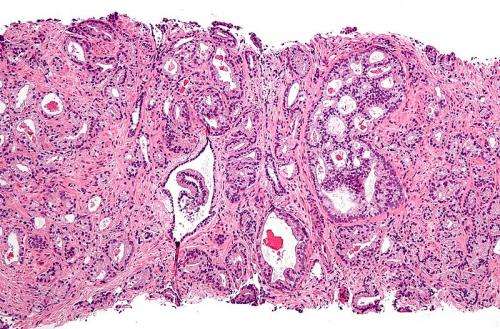Outsmarting advanced prostate cancer

International research involving the University of Adelaide has helped explain how tumour cells become resistant to common therapies used in the treatment of prostate cancer.
The findings, published in the prestigious journal Nucleic Acids Research, may lead to better patient management and new drugs for men with advanced prostate cancer.
Speaking in the lead up to Men's Health Week (15-21 June), University of Adelaide prostate cancer researcher Professor Wayne Tilley says until now, it was unclear how prostate cancer cells evade common hormone therapy treatments.
"In this study with the Masonic Cancer Centre at the University of Minnesota, we have shown that a variant of a protein present in most tumours is an important driver of resistance to hormone therapy in advanced prostate cancer," says Professor Tilley, Director of the University's Dame Roma Mitchell Cancer Research Laboratories (DRMCRL).
"This research provides important insight into how prostate cancers advance to a lethal phase.
"And we've shown that a new class of drug in clinical development for blood cancers, but not previously tested in prostate cancer, could effectively inhibit the variant protein that drives drug resistance and lethal disease.
"While we are a long way from a cure for advanced cases, this research opens the door to the development of new treatments that will be able to prolong a patient's life," he says.
Dr Luke Selth says cancer cells are resilient and highly adaptive, and this research is aimed at addressing how to outsmart them.
"Prostate cancer is one of the most commonly diagnosed cancers in men and kills more than 3,000 Australians each year," says Dr Selth, from the DRMCRL and Freemasons Foundation Centre for Men's Health.
"Many men can be cured of their prostate cancer if it is diagnosed early, through surgery and radiation therapy. However, for some men, their cancer will progress to a stage that is invariably lethal; our research is especially targeted at this group of men.
"The next stage will see us further testing and developing newer generation drugs," he says.
More information: "NAR Breakthrough Article: Targeting chromatin binding regulation of constitutively active AR variants to overcome prostate cancer resistance to endocrine-based therapies." Nucl. Acids Res. first published online April 23, 2015 DOI: 10.1093/nar/gkv262














